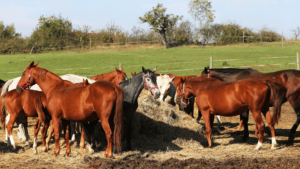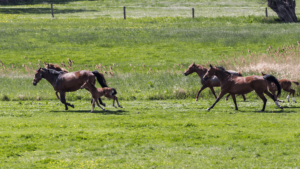The Ultimate Guide to Broodmare Care: Everything You Need to Know

This guide provides everything you need to know about caring for broodmares, from nutrition and exercise to foaling and beyond.
As a horse breeder, it is crucial to understand the importance of providing proper nutrition to your broodmares, ensuring they receive the necessary nutrients for optimal health and fertility.
Additionally, exercise and management play a significant role in maintaining their well-being and preparing them for the breeding season.
We will also delve into the reproductive cycle of broodmares, discussing the stages of the estrous cycle and determining the mare's receptivity.
Lastly, we will explore the crucial aspects of foaling and the care required for newborn foals.
Whether you are a seasoned breeder or new to the industry, this comprehensive guide will equip you with the knowledge and insights to ensure the well-being and success of your broodmares.
Nutrition for Broodmares
The well-being of a mare and her unborn foal depends heavily on the nutrition she gets. A tailored diet should be put together, taking into consideration the various stages of her reproductive cycle.
A balanced diet that includes essential vitamins, minerals, proteins, and carbohydrates is essential. High-quality forage, such as pasture or hay, should be provided to grant the mare a sufficient amount of fiber.
Occasionally, concentrates may be necessary to meet the mare's increased energy and nutrient needs.

A nutritionist can aid in determining the ideal feeding program, keeping in mind any health issues. Providing proper nutrition is essential for a successful pregnancy.
Carefully monitoring the mare's diet and body condition is vital.
Adjusting the feeding program throughout the pregnancy is important to prevent excessive weight gain.
Nutrient deficiencies can be caused by underfeeding, which can lead to poor fetal development.
Moreover, access to clean and fresh water is a must, especially during lactation when the mare needs more liquids for milk production.
A salt block or mineral supplement can also help the mare get the necessary electrolytes and trace minerals.
By taking into account all these factors, you can contribute to the overall health of both the mare and the foal.
Exercise and Management for Broodmares
When it comes to caring for equines, exercise and oversight are essential elements. To ensure their soundness and well-being, routine physical activity is necessary to keep their muscles toned and their heart healthy.
Additionally, exercise can also have a positive effect on the horse's mental state, reducing stress and promoting a tranquil and balanced temper.
This can be accomplished through various means such as daily turnouts in spacious fields or paddocks, regular hand-walking, or even light riding for those horses that are suitable for it.

With the incorporation of exercise into the daily regimen, owners can guarantee that their horses remain fit and contented during their breeding journey.
Attending to the minutia is of the utmost importance when managing equines. This includes offering them a clean and comfortable living environment, such as well-maintained stalls or generous pastures with appropriate shelter.
It is also critical to monitor their body condition and weight regularly, as it allows for adjustments to be made in their exercise and eating habits if needed. Moreover, appropriate hoof care and frequent veterinary examinations are essential components of management.
These steps not only contribute to the animal's overall health and welfare but also ensure that any potential issues or worries are addressed promptly.
By employing effective management practices, owners can create an environment that supports the horse's reproductive success and quality of life.
When it comes to equines, exercise, and management go hand in hand. While exercise provides physical and mental benefits for the horse, effective management practices guarantee that its needs are met daily.
This includes providing a balanced diet adapted to its specific nutritional requirements, as well as proper hydration and access to fresh water at all times.
Regular grooming and attention to the horse's overall appearance and hygiene are also important aspects of management.
Additionally, it is imperative to establish a routine for breeding and reproductive care, including regular veterinary checks and monitoring of the horse's reproductive cycle.
By combining exercise and management strategies, owners can maximize the health and well-being of their horses, ultimately resulting in successful breeding outcomes.
Reproductive Cycle and Receptivity in Broodmares
The reproductive cycle and receptivity of your steed is an integral piece of successful breeding. Comprehending and controlling her estrous cycle is essential for amplifying fertility.
As a horse owner, it's significant to be well-informed about the distinctive stages of the cycle and how to detect the mare's level of receptivity.
By having this knowledge, you can effectively plan and time the breeding process to raise the possibilities of conception.
This understanding allows you to make informed decisions regarding breeding methods, such as natural mating or artificial insemination and guarantees that your mare gets the proper care and attention during this essential period.
Adequate nutrition is critical for sustaining the reproductive cycle and receptivity of your equine.
Furnishing your mare with the perfect balance of nutrients is imperative for maximum conception rates and to satisfy her specific needs during different stages of the breeding process.
A thoughtfully planned feeding program, tailored to the individual mare's needs, can significantly improve her reproductive health and overall welfare.
Consulting with an equine nutritionist can assist you in developing a comprehensive feeding plan that addresses your mare's particular requirements and guarantees she obtains the necessary sustenance to support a successful reproductive cycle.
By emphasizing the nutritional needs of your mare, you can give her the greatest potential for conception and a healthy pregnancy.
Foaling and Care of Newborn Foals
As the end of the mare's gestation period approaches, anticipation builds as the foal's arrival draws near.
To ensure a safe and comfortable environment for the birthing process, the foaling stall should be kept clean and well-bedded, and equipped with cameras and monitoring systems for constant supervision.
An experienced attendant should be present to assist with any potential complications.
Immediate attention is required after foaling to ensure the newborn's health and well-being. Allow the mare and foal to develop a strong bond through natural bonding, while also assessing the foal's vital signs and ensuring it can stand and nurse.
Regular monitoring of temperature, heart rate, and respiration is essential in the first few days to detect any signs of illness or distress.
To sustain the mare's milk production, her diet should be adjusted to meet the increased energy and nutrient requirements.
High-quality hay, grain, and fresh water should be available to the mare, while the foal should begin to transition from nursing to consuming solid food.
To ensure proper growth and development, introducing creep feed is recommended.
Additionally, regular veterinary check-ups and vaccinations should be scheduled to monitor the foal's health and prevent any potential diseases.

Leave a Reply